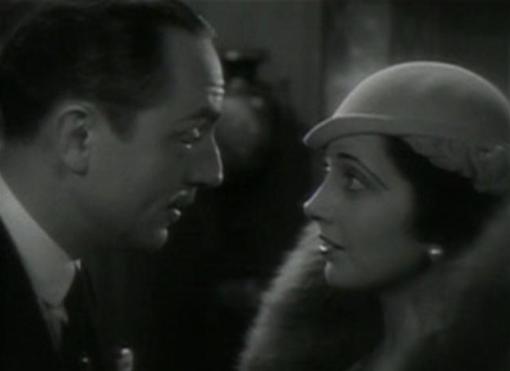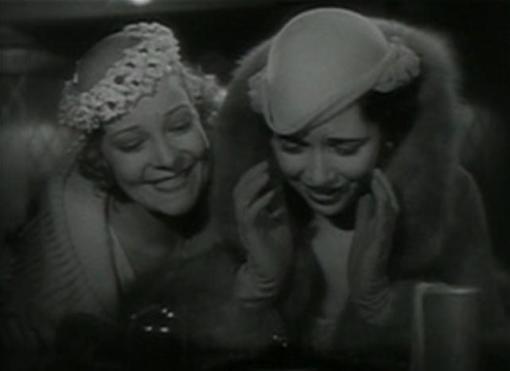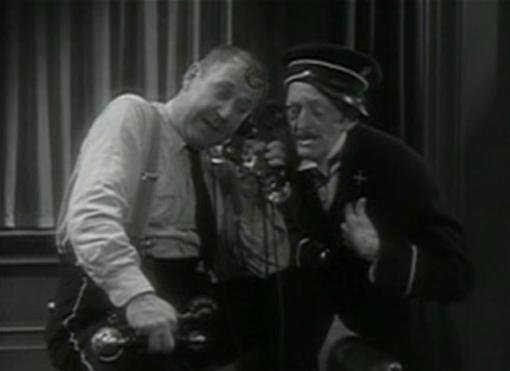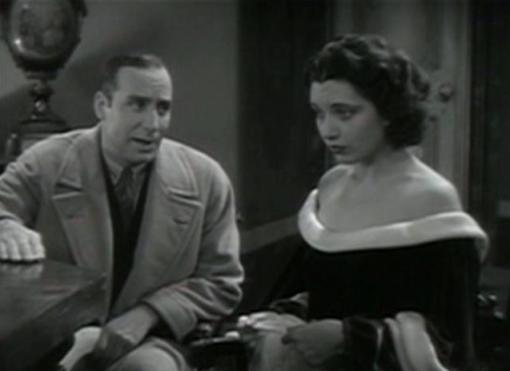This bizarre pre-Code romance finds a bored Baroness falling for a well-mannered jewel thief. What’s more she falls for him during one of his unorthodox robberies and protects him even after he flees with her brand new $50,000 (retail) diamond. With a rooftop finale that brought to my mind, of all things, Murders in the Rue Morgue (1932), Jewel Robbery succeeds in delivering a fairy tale romance which might take one of William Powell’s funny cigarettes to entirely buy, but which can be enjoyed with the clearest of minds.
Jewel Robbery won’t be for everybody as it is all at once sophisticated, yet silly.
Set in Vienna many of the actors portray a strange sort of Viennese accent that after keeping my ears perked during repeated viewings seems to have been achieved by largely avoiding contractions and adding an ever so slight pause in between words. Except at those times when they just don’t bother.
Henry Kolker as Kay Francis’ husband, the Baron, despite his appearing in only two scenes, is most guilty of varying from the Viennese-tinted English to a pure American dialect. Spencer Charters as the dimwitted night watchman Lenz offers the poorest imitation with his speech standing out as one of the few distractions of the swift moving Jewel Robbery. Kay Francis herself offers consistent and realistic dialogue throughout, though if you haven’t warmed to her famous lisp as of yet this one may be extra tough for you. Someone up high did her no favors in naming her character Teri!
One of the highlights of Jewel Robbery is the interplay between Francis’ Teri and her girlfriend Marianne played by the always catty Helen Vinson. Teri and Marianne don’t appear to have been trained for any other destiny in life but attaching themselves to an ultra-wealthy man. And then doing as they please. They’re giggly and shallow and only on their best behavior when in the presence of men with big enough bank accounts to support them. They’re also hilarious together.
A typical exchange comes when Teri tells Marianne that the Baron is going to buy her the famed 28-carat Excelsior Diamond. Marianne, confiding what she’d do to get such a treasure on her finger, says, “I’d deceive my husband, with pleasure.” Teri replies, “A woman would do much more than that. She would tolerate her husband.”
Their friendship is overshadowed by a deeper jealousy shown when Marianne delights at the prospect of the Baron perhaps balking at buying Teri the diamond as well as a total self-interest, again displayed by Marianne when she abandons Teri once potential reality looms as interruption over their light adventures.
Teri sums herself up best when waiting on the floor at Hollander’s Jewelers with Paul (Hardie Albright), a government Minister with whom she’s trying to conclude an affair. “I’m not a fine woman. In my own eyes I’m shallow and weak … I have all the qualities to make quite a decent person and what have I done with them?” She catalogs her empty days filled mostly with high dollar shopping excursions such as this one.
Meanwhile the Baron and Hollander (Lee Kohlmar) return from Hollander’s private offices with a deal having been struck. Hollander had wanted $50,000 for the Excelsior, the Baron had offered $30,000. An exact price hadn’t been named but it was certainly close to, if not exactly, the $30,000. Hollander had been having a hard time, it is the Great Depression after all, and had to take the cut-rate offer. As the Baron explains to Teri prior to negotiating the deal: “You use what weapons you can to get money. Against a rich man a revolver. Against a poor one, his poverty.”
The floor of Hollander’s is filled with a collection of thoroughly spoiled and mostly unlikable, but extremely witty, society people. Their dialogue moves fast as does the action.
Just as the deal for the Excelsior has been concluded a car pulls up and William Powell steps out. He enters Hollander’s exuding charm and immediately draws a gun on everybody declaring a robbery. Even our crook is a man of high manners. When Paul comments that he’s sure he’s seen criminal Powell before and narrows the locale down by wondering if there had been any robberies at the polo matches, Powell replies, “My dear Minister, if it was at a polo match I was playing.”
Powell is accompanied by a relatively faceless mob of assistants who empty Hollander’s showcases and vaults in a quick and business like manner. No small talk from them. In fact, their hands, fingers wrapped around pistols when not grabbing jewels, are shown more than their faces. All of the small talk belongs to Powell.
When asking Hollander if he’s insured at full value Powell offers one of the few nods to the contemporary audience in telling the jeweler that he should, “Be happy that in these spectacularly bad times I’m turning your merchandise into cash for you.”
A little later he makes Hollander wince once more when marveling over the fantastic haul he adds, “You have exquisite taste, Mr. Hollander. That’s why I’m paying you this visit.”
While Powell is as smooth as ever there is one distraction at Hollander’s, that being a quickly and thoroughly entertained Teri. Their eyes meet immediately and she feels faint in the presence of the debonair thief. She follows him about Hollander’s showroom as he empties case after case and he, without even looking up from the business at hand, flatters her the entire time even going so far as to compare her blue eyes to emeralds, a compliment Teri had previously told Marianne she was dying to hear from the lips of some man.
As he’s just about finished emptying the jeweler of his wares Powell, a bit full of himself, comments on how much better a robbery goes when you suit the method to the place: “The customary technique of terrorism would simply not have amused you. As it is the lady has smiled, the gentlemen are at ease, and we shall even have time to take a lot of the gold and silver.”
The robber keeps his audience amused when night watchman Lenz reappears. The camera shows us guns poking out from nearly every angle on Hollander and the others to keep them on their best behavior as Lenz, engaging in small talk with Powell’s robber, winds up not only carrying the stolen goods out to his car for him but also remains seated with the jewels to make sure nobody steals them while Powell wraps up things inside. “When I watch, I watch. Lenz is nobody’s fool”
Hollander himself is the only one who accepts a cigarette from the robber. He has soon forgotten his misfortune and is giggling at every comment. Teri asks what’s in the cigarettes and Powell comments that they’re “A pleasant harmless smoke. He’ll awake in the morning fresh and happy with a marvelous appetite.” Harmless Hollander is discarded and the men, the Baron and Paul, are locked into one of the jeweler’s vaults. But Teri refuses to either smoke or be locked up.
Powell practically begs Teri to let him bound her in some way but she isn’t going for it. She promises she won’t squeal on him, that instead she’s grateful for the exciting time and the story she’ll have to tell her society friends. Powell tries to entice her: “Think how much more interesting your story will be if I brutally gag you.” He adds, “You’re so lovely. It’s hard to be brutal with you.” Kay, in the typical rapid-fire dialogue of Jewel Robbery, says, “You do strike a fresh note. Up until now men have always been brutal because I am lovely.”
The romance is ratcheted up even despite Powell noticing the Excelsior Diamond and twisting Teri’s arm in a gentle bit of assault to gain possession of it. Teri smacks his face, startling even herself, to which Powell’s response is simply, “How intimate.” Verging on a deep kiss as they lean in towards one another Powell instead leaves the moment hanging and departs with a kiss blown across the length of the room. Teri collapses to a seat, fanning herself off after what has turned out to be a most sexually charged robbery.
The story continues to race. Teri isn’t completely honest with the authorities insisting for one thing that the robber was a short and fat man. She and Marianne, who’d left Hollander’s prior to the robbery, giggle like school girls over details of the charming thief, but the story becomes too exciting when they hear noises of men moving about outside the Baron’s mansion after nightfall. This is when Marianne excuses herself as noted earlier and we are on the verge of meeting our robber again as Teri takes steps towards becoming even more deeply involved with him.
Jewel Robbery is one of Warner Brothers’ fast-paced 60-70 minute pre-Code titles which benefits by way of a daring story told in a different way with never a pause to make you slow down and think. The dialogue is highbrow, the situations often lowbrow with the most famous of these being the reappearance of Powell’s marijuana cigarettes inside the office of the Chief of Police (they call him the President) when Lenz and the Chief (Clarence Wilson) get silly together arguing over Napoleon.
Kay Francis fans will love Jewel Robbery, it’s one of her best. William Powell fans, I fear, could go either way.
The reason I say that is perhaps best explained by Warner’s head of production at the time, Darryl F. Zanuck, who worried that scenes between Powell and Francis not become “too overly-polite and not played too ultra-sophisticated,” as Powell “gets almost bird-like and like a fairy, bowing and scraping too much. Keep him manly and keep him dashing and then you’ll have a great romantic, adventurous story, and that’s what it is” (Bryant 88).
I think director William Dieterle accomplished that, but I admit it’s open to debate. Powell is for the most part Powell-like, perhaps never more debonair or urbane, the two words most used to describe him as some of his most popular characters. But the fact that I entirely get the “bird-like” comment makes me think Dieterle didn’t completely wipe that off the performance.
For the German emigre Dieterle, Jewel Robbery is one of his earliest American assignments which when its dialogue is at its best shows touches of Lubitsch while some of the images recall the German Expressionism that the director cut his teeth on back home in the previous decade. Dieterle would become best known for his later biographical works at the studio, including The Story of Louis Pasteur (1936), The Life of Emile Zola (1937), Juarez (1939), A Dispatch from Reuters (1940), and others.
I’d love to have first hand knowledge of how a 1932 audience, in the depths of the Great Depression, received Jewel Robbery. While it makes its nods to there being tough times, basically by indicating the jeweler is hard up for a sale and hints at a Bonnie and Clyde like fascination by the public with the slew of jewel robberies throughout Vienna, every one of the characters makes a good case for being hard to take. All the more harder if you’re hard up.
That said, with a mood established near the very start by a butler smacking a maid’s backside even before we meet Kay Francis, wearing only her bubble bath once we do, Jewel Robbery is slathered with sex and sexual innuendo from beginning to end. And if the hot and bothered characters weren’t enough to entertain crowds of the day they throw those funny cigarettes into the mix to up the sin quotient even more.
So my own assumption about Jane and Joe Theatergoer, circa 1932, would be that they would have been as pleasantly distracted, surprised, and even to some degree titillated by Jewel Robbery as we get to be all over again today.
William Powell and Kay Francis would work together again for the sixth and final time in what was the very next picture for each of them, One Way Passage (1932). After that Powell would move from criminal to lawyer in Lawyer Man (1932), while Francis would star with Herbert Marshall and Miriam Hopkins in the Ernst Lubitsch classic Trouble in Paradise (1932) on loan to her old studio, Paramount.
Jewel Robbery, including William Powell’s performance, works very well for me despite any problems I mentioned above. Like so many of my favorite pre-Code titles from Warner Brothers it’s fast and imperfect, elements which help make it stand out as not only entertaining but different, in Jewel Robbery’s case, even unique. What did you think?
Sources
Bryant, Roger. William Powell: The Life and Films. Jefferson, NC: McFarland & Company, Inc., 2006.















[…] the Forbidden Hollywood banner on June 26 are Ladies They Talk About (1933), Hard to Handle (1933), Jewel Robbery (1932), Lawyer Man (1932) and Man Wanted […]